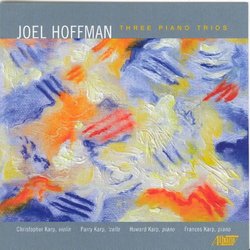A Family Affair
J Scott Morrison | Middlebury VT, USA | 10/21/2006
(5 out of 5 stars)
"The provenance of this CD is worth comment. The composer Joel Hoffman, professor of composition at the University of Cincinnati's College-Conservatory of Music, is a member of a distinguished family of musicians. His brother Toby is a noted violist and conductor, his brother Gary a fine cellist, his sister Deborah a harpist, his mother a superb violinist. Obviously he grew up in a music-making family and relates that making music gives him a family feeling. The music presented on this CD, Hoffman's three piano trios, is played by another musical family, the Karps. The second and third trios were commissioned by Christopher Karp, the violinist here. Karp is a professor of pediatrics at the University of Cincinnati School of Medicine, but before that was a professional violinist and he obviously keeps up his chops. The other musicians on the CD are his parents, pianists Howard and Frances Karp, and his brother, cellist Parry Karp. Frances plays in the first trio, Howard in the second and third. One can only imagine the good feelings that all must have had making the music on this CD and somehow that comes across in the performances.
The first of Hoffman's trios was written in 1991 for the Golub-Kaplan-Carr trio but was taken up by the Karps after the second and third trios were commissioned by Christopher Karp. Entitled 'Cubist Blues' it begins with a raffish piano prologue that sets out some of the major themes of the work. As Hoffman states it is 'all about jazz but isn't a jazz piece.' There certainly are jazz-like harmonies and rhythms abounding. The prologue is followed without pause by four blues and then rounded off by an epilogue. The 'cubist' in the title refers to the prismatic manner in which the main materials are refracted and distorted along the way, much the way Picasso and Braque worked with their visual materials. It is a tonal work that is consistently engaging.
Trio No. 2 (2003), subtitled 'Lost Traces', is a quarter-hour piece in one movement and is related to but not excerpted from Hoffman's opera 'The Memory Game.' (In psychology, memories are often referred to as 'traces'.) Some of the materials in the trio came from the opera but they are given entirely different treatment. Even though twelve years had passed since Hoffman wrote the first trio, one hears recognizably Hoffmanesque 'traces' (pun intended) common to both trios. These consist of an emphasis on lyrical melodies, engaging rhythmic figures, and a crafty deconstruction and reassembling of musical materials.
Trio No. 3 (2004), designated as 'on C sharp' rather than 'in C sharp', is in three movements that begin and end on the note C sharp but not actually in the tonality of C sharp. Rather, C sharp acts as a loosely adhered to gravitational pole for the music, while the music itself ranges widely and sometimes vaguely harmonically. Again, there are jazz elements, expert writing for the three instruments -- each of the instrumentalists, here as in the earlier works, get plenty of opportunity to shine in solo passages -- and, in the third movement, a serious side, occasionally lightened by scherzo-like passages, that seem to be posing knotty questions, albeit in easily assimilable quasi-tonal language. The work opens with a whimsical movement followed by lyrical aria. The gravitational center of the work, though, resides in the 16-minute final movement which I find to be both moving and troubling in its complexity and earnestness. Hoffman writes that he wrote the movement while troubled by current US foreign policy and the war in Iraq.
Recorded sound tends to favor the piano, but not to an alarming degree (and as a pianist I rather liked it!) but is otherwise clear and lifelike, if a bit claustrophobic at times. The performances are excellent. I found myself pleased again and again at the fact that the CD is the product of the interaction of two profoundly musical families. The recording was made at the Cincinnati Conservatory.
Recommended.
Scott Morrison"


 Track Listings (3) - Disc #1
Track Listings (3) - Disc #1